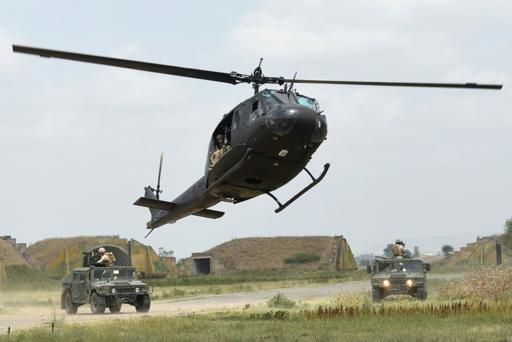NATO on Wednesday defended the number of military exercises it has staged as a response to "growing Russian aggression" and refuted suggestions that they were helping make war in Europe more likely.
The alliance was reacting to a warning from a London-based think tank about the risks from a sharp increase in Russian and NATO war games since the conflict between the Ukrainian government and pro-Russian separatists flared up in April last year.
"NATO military exercises are not, as the reports suggest, making war in Europe more likely," NATO spokeswoman Carmen Romero said after the European Leadership Network (ELN) published its assessment.
"They are intended precisely to have the opposite effect: to enhance security and stability in Europe in response to growing Russian aggression," Romero said in a statement.
"All NATO military activities are proportionate, defensive, and fully in line with our international commitments," she added.
The ELN report was titled: "Preparing for the Worst: Are Russian and NATO Military Exercises Making War in Europe more Likely?"
It profiled a Russian exercise in March this year involving 80,000 military personnel and a series of NATO "Allied Shield" manoeuvres along the alliance's eastern flank that involved 15,000 personnel from 19 member states and three partner states.
The ELN report authors said the nature and scale of the exercises contradicted claims from both sides that they targeted hypothetical opponents.
"Russia is preparing for a conflict with NATO, and NATO is preparing for a possible confrontation with Russia," ELN said.
It did not suggest that either side has decided to go to war or that war is inevitable, but warned that the exercises fuelled tensions.
And when the exercises are not announced beforehand, as seems to be the case with Russian manoeuvres, the situation becomes more unpredictable, it said.
It called for both NATO and Russia to boost communications about exercises as well as examine the benefits and risks of increased war games.
The two sides, it said, should start "conceptual work" as soon as possible on a treaty limiting both sides from deploying certain types of weapons.
Romero said the "report misleadingly puts NATO and Russian exercises on a par," adding that Moscow has announced 4,000 exercises for this year, more than ten times what the allies have planned.
"Moreover, Russia has incorporated nuclear and nuclear capable forces in its recent exercises," Romero said.
She said NATO has already gone beyond the recommendations of the ELN report by taking "new initiatives" to keep political and military channels with Russia open.
Romero also said NATO exercises, unlike those conducted by Russia, are announced months in advance and are open to observers, including from Russia.





















































